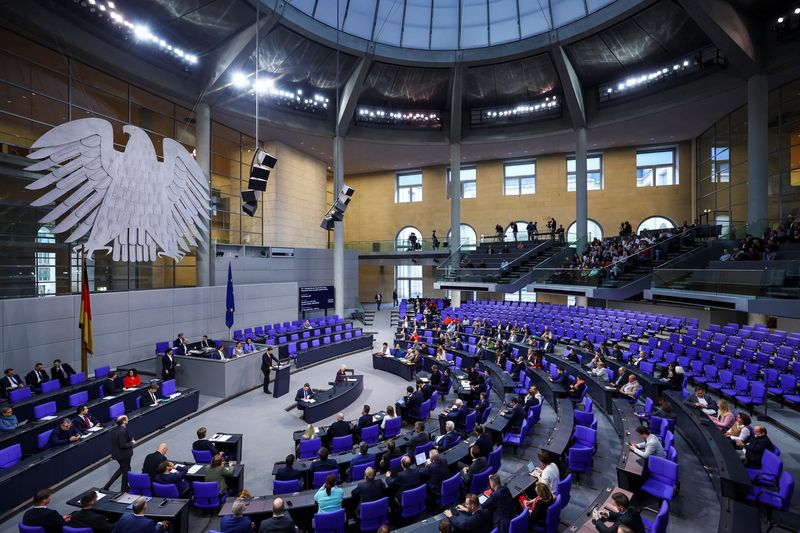By Thomas Escritt
BERLIN (Reuters) - Germany's political parties agree on few things after Chancellor Olaf Scholz's coalition collapsed last week following months of budget wrangling, but protecting the Constitutional Court from the far left and right looks likely to be one of them.
The departure from the coalition of the neoliberal Free Democrats (FDP) deprived Scholz's government of its parliamentary majority and left in limbo dozens of laws the coalition had been scheduled to pass in its remaining time.
On Tuesday, new Finance Minister Joerg Kukies said the government would concentrate on passing laws that were already well advanced through the legislative process.
An election to choose members of the federal parliament is expected to be held on Feb. 23 next year.
WHAT IS PLANNED FOR THE CONSTITUTIONAL COURT?
Seen as the ultimate guarantor of German democracy, the court could be vulnerable if populist right and left parties win a third of the seats in parliament after the elections, as polls suggest they might.
That would allow the far-right Alternative for Germany (AfD) or the populist left Sahra Wagenknecht Alliance to block appointments of new judges indefinitely, leading to caseload backlogs and gumming up the wheels of justice.
Measures to make blocking nominations harder are seen as more urgent after regional votes in the autumn in which the AfD won blocking minorities in two states. Legal experts fear far-right parties could turn the supreme court into an instrument of their power, as governments in Poland and Hungary have done.
The three coalition parties and the conservatives had already agreed on measures to protect the court before the collapse, meaning a last-minute push to get the message through is likely.
ARMY DEPLOYMENTS
Germany's armed forces answer to parliament, not the government, meaning it will need to vote to prolong the mandates for four foreign missions whose authorisations are set to expire.
WHICH LAWS' FATES ARE UNCERTAIN?
The Deutschlandticket, a signature achievement of Scholz's government, gives unlimited travel on local and regional transport for a monthly flat rate of 58 euros for next year. Though popular, its 1.5 billion euro price tag needs to be approved for next year. The Greens would like to extend it until next year. Conservative leader Merz was non-committal when asked about it on Tuesday.
Measures to address fiscal drag from inflation on tax bands and child benefits are also uncertain to pass: while the Greens would like to see them advanced before the elections, Merz was sceptical.
Most parties have made positive noises about the prospects of extending support for Ukraine before the elections, though there is some disagreement on how much legislation is needed to do this.
WHICH LAWS WILL FALL BY THE WAYSIDE?
A law that would promote the building of hydrogen-ready power stations was set to be sent to regional governments for consultation when the coalition collapsed. Though the extra capacity is urgently needed to complement wind and solar power, ministers do not believe there is time to get it through parliament.
There is no time to pass the 2025 budget, Kukies said on Tuesday.

The SPD's plan for a guaranteed minimum pension of 48% of the average wage is also expected to be dropped.
A plan to reintroduce a limited military service obligation is also expected to fail.